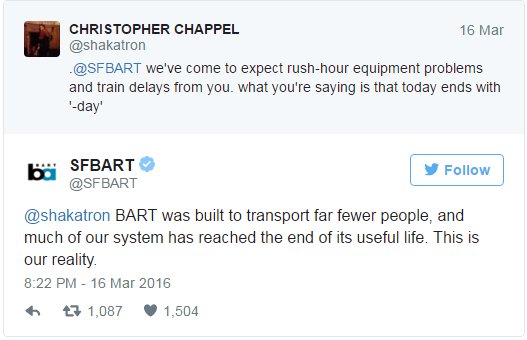 Commentators routinely recommend that PR and marketing professionals be honest and transparent on social media. Yet some PR observers wonder if tweets from the San Francisco-area Bay Area Rapid Transit (BART) showed too much candor.
Commentators routinely recommend that PR and marketing professionals be honest and transparent on social media. Yet some PR observers wonder if tweets from the San Francisco-area Bay Area Rapid Transit (BART) showed too much candor.
BART is an overburdened public transit system plagued by aging equipment, budget shortfalls and surging ridership. Delays, breakdowns and frustrated riders are common.
Electrical problems recently knocked 50 trains out service and sparked a social media outburst. Unsurprisingly, riders expressed their anger on Twitter. What surprised many were BART’s frank responses.
Rather than issue the standard “sorry,” BART spokesman, Taylor Huckaby, explained the situation. The transit system is operating far beyond its capacity. It needs to replace a substantial amount of rail lines, and it faces difficulties completing track maintenance within short-lived timeframes. In one tweet, he illustrated its ridership growth by pointing out that the number of people exiting at an Oakland station has doubled in less than a decade.
Tweets to Explain the Reality
“BART was built to transport far fewer people, and much of our system has reached the end of its useful life. This is our reality,” he tweeted to one complaining rider. That tweet was retweeted 600 times, noted GovTechSocial. Other Twitter conversations attracted considerable attention, many with the hashtag #ThisIsOurRealty.
 Huckaby countered complaints and attempted to explain the vast scope of the system’s needs. BART, used by over 450,000 commuters day, projects that it needs $9.6 billion over the next 10 years to fully fund its planned improvement program. His approach was especially candid for public agencies, typically perceived as being guarded on social media. Most use Twitter for broadcasting announcements rather than to engage directly with users.
Huckaby countered complaints and attempted to explain the vast scope of the system’s needs. BART, used by over 450,000 commuters day, projects that it needs $9.6 billion over the next 10 years to fully fund its planned improvement program. His approach was especially candid for public agencies, typically perceived as being guarded on social media. Most use Twitter for broadcasting announcements rather than to engage directly with users.
Some praised BART and Huckaby for both acknowledging riders’ frustration and educating them about root causes of problems. Others mocked his tweets and lambasted BART as incompetent, saying rail service has been promising action and giving excuses for years. Some, including me, construed Huckaby’s comments as a public form of lobbying, intended not for the riders but mostly for the politicians who provide funding and financing,
Huckaby says he has the full support of confidence of his coworkers and superiors at BART.
“Most government social media folks are not really given the leeway to respond to people in a way that’s authentic,” he told The New York Times. “They give the canned response, the ‘we’re sorrys,’ the automation. They’re afraid of looking incompetent by saying the wrong thing, so they end up saying nothing, which ironically leaves them looking incompetent anyway.”
Too Much Honesty?
Some observers question the wisdom of extensive honesty on social media. Too much candor combined with a lack of solutions can harm an organization’s image, warned Patricio Robles at Econsultancy. Its situation shows the danger of engaging with social media users over negative mentions without definite and imminent solutions in hand.
“BART runs the risk of looking like an organization that’s better at complaining about what it doesn’t have than trying to provide good service with what it does have,” Robles stated. “Furthermore, it opens itself up to the very critics who suggest it hasn’t used its resources wisely.”
At some point, social media honesty can go too far, says communications professional Ian Shea-Cahir. Late in a soccer game against rival team Sunderland, Manchester United tweeted: “Time is running out at the Stadium of Light and, in truth, Sunderland look the more likely winners at the moment.”
In a LinkedIn Pulse post, Cahir questioned if the tweet was very bold or very stupid. It was an accurate assessment — the team managed a 1-1 draw despite lackluster playing. However, it enraged Manchester United fans and provided fodder for the media and fans of rival teams.
Bottom Line: BART’s candid Twitter exchanges raised eyebrows and drew even more attention than its substantial service problems. While some praised its direct tone, others wonder if honesty on social media can go too far.
What’s your opinion? Was BART being too candid on social media? Please comment below.
William J. Comcowich founded and served as CEO of CyberAlert LLC, the predecessor of Glean.info. He is currently serving as Interim CEO and member of the Board of Directors. Glean.info provides customized media monitoring, media measurement and analytics solutions across all types of traditional and social media.




